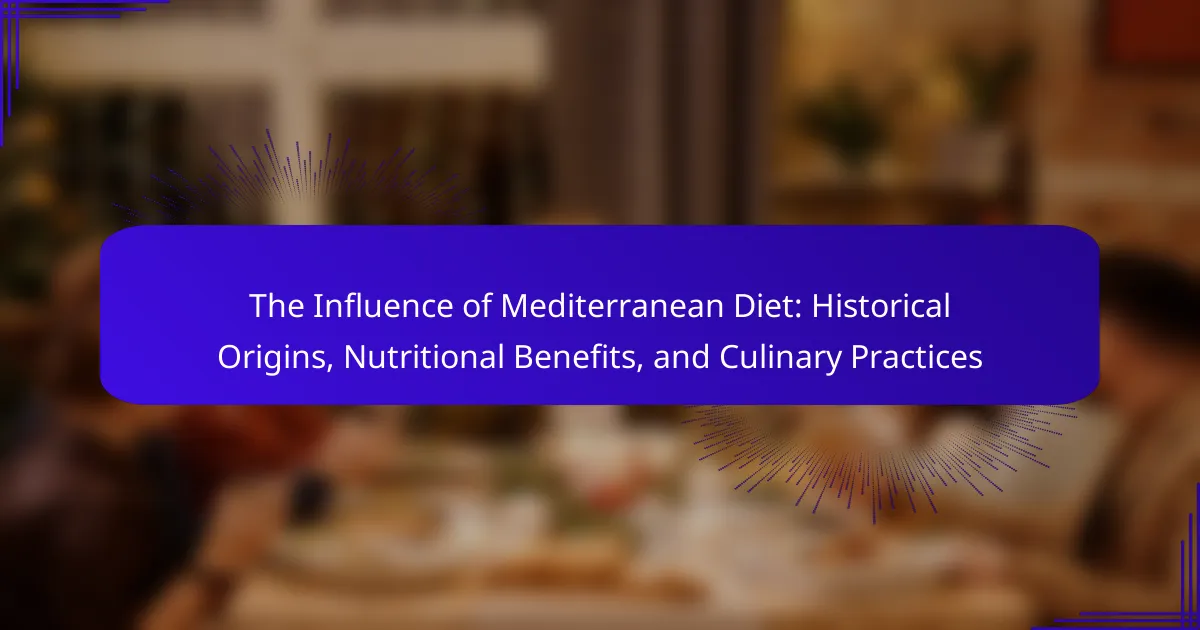
What is the Mediterranean Diet?
The Mediterranean Diet is a dietary pattern inspired by the traditional eating habits of countries bordering the Mediterranean Sea. It emphasizes the consumption of fruits, vegetables, whole grains, legumes, nuts, and olive oil. This diet includes moderate amounts of fish and poultry, while red meat is consumed sparingly. Dairy products, primarily cheese and yogurt, are included in moderation. Research indicates that this diet is associated with numerous health benefits, including reduced risk of heart disease and improved longevity. The Mediterranean Diet is rich in antioxidants and healthy fats, which contribute to its health-promoting properties. Studies show that adherence to this diet can lead to better weight management and lower cholesterol levels.
How did the Mediterranean Diet originate?
The Mediterranean Diet originated from the traditional eating patterns of countries bordering the Mediterranean Sea. This dietary pattern has roots in ancient civilizations, particularly in Greece and Italy. Historical evidence shows that these populations consumed a diet rich in fruits, vegetables, whole grains, legumes, and healthy fats, particularly olive oil. The diet was also characterized by moderate consumption of fish and poultry, with limited intake of red meat and sweets.
Research indicates that the Mediterranean Diet was shaped by agricultural practices, cultural exchanges, and local food availability throughout history. The diet gained recognition in the 20th century when researchers noted its association with lower rates of chronic diseases. The Seven Countries Study, conducted by Ancel Keys in the 1950s, highlighted the health benefits of this dietary pattern. This study provided significant evidence linking the Mediterranean Diet to longevity and reduced risk of heart disease.
What historical factors contributed to the development of the Mediterranean Diet?
The Mediterranean Diet developed due to several historical factors. Ancient agricultural practices laid the foundation for its food sources. Cultivation of olives, grapes, and grains began thousands of years ago in the region. Trade routes facilitated the exchange of spices, herbs, and cooking techniques. Cultural influences from neighboring civilizations shaped dietary habits. The rise of the Roman Empire spread Mediterranean food customs across Europe. Additionally, religious practices influenced food consumption patterns, promoting certain ingredients. The post-World War II era saw a resurgence in traditional diets, emphasizing local, seasonal foods. These historical contexts collectively shaped the Mediterranean Diet as we know it today.
Which regions are primarily associated with the Mediterranean Diet?
The regions primarily associated with the Mediterranean Diet include Southern Europe, North Africa, and parts of the Middle East. Southern Europe features countries like Italy, Greece, and Spain, which are known for their traditional diets rich in fruits, vegetables, whole grains, and healthy fats. North African countries such as Morocco and Tunisia also embrace similar dietary patterns. The Mediterranean Diet emphasizes fresh, local ingredients and a lifestyle that includes communal meals. This dietary pattern has been linked to numerous health benefits, including reduced risk of chronic diseases. Research supports the positive impact of this diet on health, highlighting its role in promoting longevity and well-being.
What are the key components of the Mediterranean Diet?
The key components of the Mediterranean Diet include a high intake of fruits, vegetables, whole grains, and legumes. This diet emphasizes healthy fats, particularly olive oil, while minimizing saturated fats. It also includes moderate consumption of fish and poultry, with limited red meat intake. Dairy products, mainly yogurt and cheese, are consumed in moderation. The Mediterranean Diet encourages the use of herbs and spices for flavor instead of salt. Additionally, it promotes regular physical activity and sharing meals with family and friends. Research shows that this diet is associated with numerous health benefits, including reduced risk of heart disease and improved longevity.
What types of foods are included in the Mediterranean Diet?
The Mediterranean Diet includes a variety of foods that emphasize whole, minimally processed ingredients. Key components are fruits and vegetables, which provide essential vitamins and minerals. Whole grains, such as bread and pasta, are staples that offer fiber and energy. Healthy fats are primarily sourced from olive oil and nuts. Fish and seafood are preferred protein sources, contributing omega-3 fatty acids. Poultry and dairy, particularly yogurt and cheese, are consumed in moderation. Red meat is limited, making this diet heart-healthy. Legumes, such as beans and lentils, are also important for their protein and fiber content. This diet has roots in the traditional eating patterns of countries bordering the Mediterranean Sea.
How do these foods contribute to a balanced diet?
Foods in the Mediterranean diet contribute to a balanced diet by providing essential nutrients and promoting health. They are rich in fruits, vegetables, whole grains, and healthy fats. These foods supply vitamins, minerals, and antioxidants necessary for bodily functions. Research shows that diets high in these components can reduce the risk of chronic diseases. For instance, a study published in the New England Journal of Medicine found that adherence to the Mediterranean diet significantly lowered cardiovascular events. This diet also includes moderate amounts of fish and poultry, which provide high-quality protein. The inclusion of legumes and nuts adds fiber and healthy fats, improving digestive health. Overall, these foods create a diverse and nutrient-rich dietary pattern that supports overall well-being.
What nutritional benefits does the Mediterranean Diet provide?
The Mediterranean Diet provides numerous nutritional benefits. It is rich in healthy fats, particularly from olive oil, which can lower the risk of heart disease. This diet includes a high intake of fruits, vegetables, whole grains, and legumes, contributing essential vitamins and minerals. Studies show that adherence to the Mediterranean Diet is associated with reduced inflammation and improved metabolic health. Research published in the journal “Circulation” indicates that this diet can lead to a 30% lower risk of cardiovascular disease. Additionally, it promotes weight management and can enhance cognitive function, as noted in studies by the “New England Journal of Medicine.”
How does the Mediterranean Diet promote heart health?
The Mediterranean Diet promotes heart health through its emphasis on healthy fats, whole grains, and plant-based foods. This diet includes high amounts of olive oil, nuts, and fish, which are rich in omega-3 fatty acids. Omega-3 fatty acids help reduce inflammation and lower blood triglyceride levels. Additionally, the diet is low in saturated fats and processed foods, which are linked to heart disease. Studies show that adherence to the Mediterranean Diet can lower the risk of cardiovascular events by up to 30%. Regular consumption of fruits and vegetables provides essential vitamins and antioxidants that support heart health. Overall, the Mediterranean Diet fosters a heart-healthy lifestyle through balanced nutrition and sustainable eating habits.
What role does the Mediterranean Diet play in weight management?
The Mediterranean Diet aids in weight management by promoting balanced food intake and healthy eating habits. It emphasizes whole foods like fruits, vegetables, whole grains, fish, and healthy fats. This diet is lower in red meat and processed sugars, which can contribute to weight gain. Research indicates that individuals following this diet tend to have lower body mass indices (BMIs) compared to those on other diets. A study published in the New England Journal of Medicine found that participants adhering to the Mediterranean Diet experienced significant weight loss and improved metabolic health. This diet’s focus on portion control and nutrient-dense foods supports sustainable weight management.

What are the culinary practices associated with the Mediterranean Diet?
The culinary practices associated with the Mediterranean Diet emphasize fresh, seasonal ingredients. This diet includes a high intake of fruits, vegetables, whole grains, and legumes. Olive oil is the primary fat used for cooking and dressing. Fish and seafood are consumed regularly, while red meat is eaten less frequently. Meals often feature herbs and spices instead of salt for flavor. Traditional cooking methods include grilling, baking, and sautéing. Social dining is also a key aspect, with meals typically shared among family and friends. These practices contribute to the diet’s health benefits, including reduced risk of chronic diseases.
How are meals typically prepared in the Mediterranean Diet?
Meals in the Mediterranean Diet are typically prepared using fresh, seasonal ingredients. Cooking methods often include grilling, roasting, and sautéing. These techniques help retain nutrients while enhancing flavors. Olive oil is commonly used as the primary fat for cooking and dressing. Herbs and spices are favored over salt for seasoning. Meals are often enjoyed family-style, encouraging shared dining experiences. Fish and seafood are staples, while red meat is consumed less frequently. Whole grains, legumes, fruits, and vegetables are central to meal preparation. The emphasis is on balance and variety, promoting overall health.
What cooking techniques are commonly used in Mediterranean cuisine?
Common cooking techniques in Mediterranean cuisine include grilling, roasting, baking, steaming, and sautéing. Grilling is often used for meats and vegetables, imparting a smoky flavor. Roasting enhances the natural sweetness of ingredients, especially in dishes featuring root vegetables. Baking is prevalent in making bread and pastries, central to Mediterranean meals. Steaming retains nutrients in vegetables, preserving their vibrant colors and flavors. Sautéing quickly cooks food in a small amount of oil, enhancing taste and texture. These techniques reflect the region’s emphasis on fresh ingredients and simple preparation methods.
How does meal presentation influence the Mediterranean dining experience?
Meal presentation significantly influences the Mediterranean dining experience by enhancing visual appeal and cultural authenticity. In Mediterranean cuisine, vibrant colors and artistic arrangements reflect the region’s rich agricultural heritage. Dishes are often served in a communal style, promoting sharing and social interaction. This presentation style fosters a sense of togetherness, which is central to Mediterranean dining culture. Research indicates that visually appealing meals can enhance taste perception and overall satisfaction. A study published in the International Journal of Gastronomy and Food Science found that attractive food presentation increases diners’ enjoyment and willingness to return to a restaurant. Thus, meal presentation in Mediterranean dining is not merely aesthetic; it plays a crucial role in the overall dining experience.
What traditional dishes exemplify the Mediterranean Diet?
Traditional dishes that exemplify the Mediterranean Diet include Greek salad, hummus, and ratatouille. Greek salad features fresh vegetables, olives, and feta cheese, highlighting the diet’s emphasis on plant-based ingredients. Hummus, made from chickpeas and tahini, is a staple in Middle Eastern cuisine and rich in healthy fats. Ratatouille is a vegetable stew from France, showcasing seasonal produce and olive oil. These dishes reflect the Mediterranean Diet’s focus on whole foods, healthy fats, and minimal processing. The Mediterranean Diet is recognized for its health benefits, including reduced risk of heart disease and improved longevity.
Which recipes are considered staples in Mediterranean cuisine?
Staple recipes in Mediterranean cuisine include dishes like hummus, tabbouleh, and ratatouille. Hummus is a blend of chickpeas, tahini, lemon juice, and garlic. It is popular across the Levant region. Tabbouleh is a parsley salad with bulgur, tomatoes, and mint, originating from Lebanon. Ratatouille is a vegetable stew from Provence, featuring eggplant, zucchini, and bell peppers. Other staples are Greek salad, featuring tomatoes, cucumbers, olives, and feta cheese, and paella, a rice dish from Spain with seafood or meat. These recipes reflect the region’s agricultural diversity and cultural influences.
How do these dishes reflect the principles of the Mediterranean Diet?
Mediterranean dishes reflect the principles of the Mediterranean Diet through their emphasis on whole foods, healthy fats, and plant-based ingredients. These dishes typically include fruits, vegetables, whole grains, legumes, and nuts. Olive oil serves as a primary fat source, promoting heart health. Fish and poultry are favored over red meat, aligning with dietary guidelines. Meals are often prepared using fresh, seasonal ingredients, enhancing nutritional value. Additionally, the Mediterranean Diet encourages moderate wine consumption, particularly red wine, which has been linked to health benefits. This dietary pattern supports longevity and reduces chronic disease risk, as evidenced by studies highlighting lower rates of heart disease in Mediterranean populations.

How can one effectively adopt the Mediterranean Diet?
To effectively adopt the Mediterranean Diet, focus on consuming whole foods, particularly fruits, vegetables, whole grains, nuts, and seeds. Incorporate healthy fats, especially olive oil, as the primary fat source. Include fish and poultry in moderation while limiting red meat and processed foods. Aim for regular meals that emphasize plant-based ingredients. Hydration should primarily come from water, with moderate wine consumption if desired. This diet has been linked to numerous health benefits, such as reduced risk of heart disease and improved longevity, as evidenced by studies like the PREDIMED trial, which found significant cardiovascular benefits associated with adherence to the Mediterranean Diet.
What practical tips can help in transitioning to the Mediterranean Diet?
Start by incorporating more fruits and vegetables into meals. Aim for at least five servings per day. Use whole grains instead of refined grains. Opt for brown rice, whole wheat pasta, and quinoa. Include healthy fats such as olive oil in cooking and dressings. Replace butter and margarine with olive oil for better heart health. Incorporate fish and seafood at least twice a week. Choose fatty fish like salmon and sardines for omega-3 benefits. Limit red meat consumption to a few times a month. Focus on legumes, nuts, and seeds as protein sources. Drink water as the primary beverage, minimizing sugary drinks and sodas. Emphasize herbs and spices for flavor, reducing reliance on salt. These tips align with the Mediterranean Diet’s emphasis on whole, unprocessed foods.
How can meal planning simplify the adoption of the Mediterranean Diet?
Meal planning simplifies the adoption of the Mediterranean Diet by providing structure and organization. It allows individuals to prepare meals in advance, ensuring they include the diet’s key components. These components include fruits, vegetables, whole grains, legumes, and healthy fats. By planning meals, individuals can avoid impulse purchases of less healthy options. Research shows that meal planning can lead to healthier eating patterns and better adherence to dietary guidelines. A study published in the Journal of Nutrition found that individuals who plan meals are more likely to consume a balanced diet. This practice also reduces food waste and saves time during the week. Overall, meal planning is a practical tool for successfully integrating the Mediterranean Diet into daily life.
What common challenges might one face when starting the Mediterranean Diet?
Common challenges when starting the Mediterranean Diet include adapting to new food choices and meal planning. Many individuals may struggle with replacing familiar foods with healthier options. The diet emphasizes fruits, vegetables, whole grains, and healthy fats, which can be a significant shift. Additionally, some may find it difficult to adjust portion sizes and frequency of meals. Social situations can also pose a challenge, as traditional meals may not align with the Mediterranean approach. Lastly, accessibility to specific ingredients, such as fresh seafood or quality olive oil, can vary by location, complicating adherence to the diet.
What resources are available for further exploration of the Mediterranean Diet?
Books, websites, and documentaries are available for further exploration of the Mediterranean Diet. Notable books include “The Complete Mediterranean Cookbook” by America’s Test Kitchen and “Mediterranean Diet for Dummies” by Marissa Cloutier and Eve Adamson. Websites such as Oldways and the Mediterranean Diet Foundation offer extensive resources and guidelines. Documentaries like “In Search of the Perfect Human Diet” provide visual insights into Mediterranean eating. These resources collectively offer a comprehensive understanding of the diet’s principles, recipes, and health benefits.
Which books or websites provide valuable information about the Mediterranean Diet?
Books that provide valuable information about the Mediterranean Diet include “The Complete Mediterranean Cookbook” by America’s Test Kitchen and “Mediterranean Diet for Dummies” by Meri Raffetto and Wendy Jo Peterson. Websites like the Oldways Mediterranean Diet website and the Mediterranean Diet Foundation offer extensive resources. These sources present recipes, nutritional guidelines, and insights into the health benefits of the diet. They are well-regarded for their reliable information and practical advice on adopting the Mediterranean lifestyle.
How can community support enhance the experience of adopting the Mediterranean Diet?
Community support can significantly enhance the experience of adopting the Mediterranean Diet. This support creates a shared environment that encourages individuals to engage with the diet more fully. Local groups or online communities provide access to resources, recipes, and meal plans specific to the Mediterranean Diet. They also offer motivation through shared experiences and success stories. Studies indicate that social support can improve dietary habits and adherence. For instance, research published in the Journal of Nutrition Education and Behavior found that individuals who participated in group-based nutrition programs were more likely to sustain healthy eating patterns. Furthermore, community cooking classes and potlucks foster social interaction and make the adoption of new foods enjoyable. This collective approach helps individuals feel less isolated in their dietary changes. Overall, community support fosters accountability and enhances the enjoyment of the Mediterranean Diet.
The Mediterranean Diet is a dietary pattern rooted in the traditional eating habits of countries bordering the Mediterranean Sea, emphasizing fruits, vegetables, whole grains, legumes, nuts, and olive oil. This article explores its historical origins, key components, and nutritional benefits, highlighting its association with reduced risk of chronic diseases and improved longevity. It also examines culinary practices, meal preparation techniques, and practical tips for adopting the diet, while addressing common challenges and community support resources available for individuals interested in this health-promoting lifestyle.
